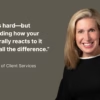Start-ups, non-profits, small & mid-sized companies and the Fortune 500 continue to use executive coaching to develop their leaders. The challenges – when to use coaching? how to determine expectations and measure impact? What criteria should be used in selecting a coach? who to provide coaching to? Hopefully the following can shed some light on what I have seen in the last 30 years and what we have experienced in the last few:
- Most coaching today is for development purposes. Helping an established leader address one or several areas to be more successful or to assist in getting to the next level in their career and leadership effectiveness. Punitive coaching still occurs, but infrequently as most organizations are hesitant to make such a substantial investment for someone with a questionable future within the organization.
- Organizations often struggle with setting expectations, often not completely addressing the rationale for coaching. Coaching is often used to flush out what to develop.When specifics are clear, coaching is off to a significantly better start with less doubt, skepticism and concern as to why coaching is really being offered. Impact is measured when clear expectations are initially addressed, with agreed upon means of measuring success. A key issue today is the struggle and hesitancy to hold leaders accountable for results and behavior and talent management metrics.
- Many professionals have entered the coaching field the last several years. The challenge – how to determine qualifications, track-record and impact. Recently there has been significant emphasis to have coaches ICF certified. I applaud this but there are several additional key considerations – a person’s academic training & credentials, their behavioral assessment, employee engagement certifications, and I believe a critically overlooked qualification – a coach’s business and leadership experiences and accomplishments. A coach with no leadership or business experience hopefully will help increase self-awareness and provide feedback from survey’s, but there is no substitute for someone who has had to progress to several levels of management, including executive management, and has run several functions, P&L, and has had to manage change, M&A, growth and restructures. Coaches should also be able to provide a proven coaching methodology and process.
- Coaching is primarily offered to senior level leaders. We are beginning to see an increase of coaching offered to additional levels, which is fantastic. Why? the Premise – if high potentials and new managers are provided with critical skills, learning, techniques, strategies and awareness, this will accelerate their effectiveness and impact the organization and its objectives.
Chuck Mollor, Executive Coach & Managing Partner







